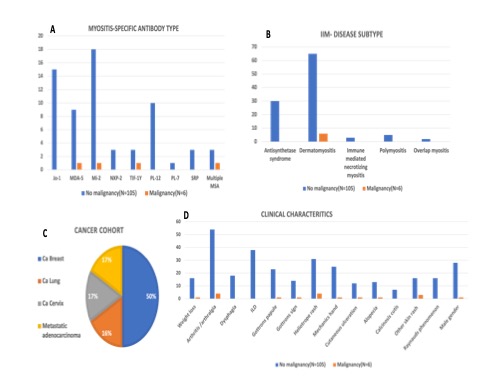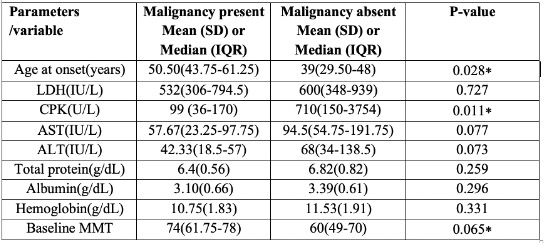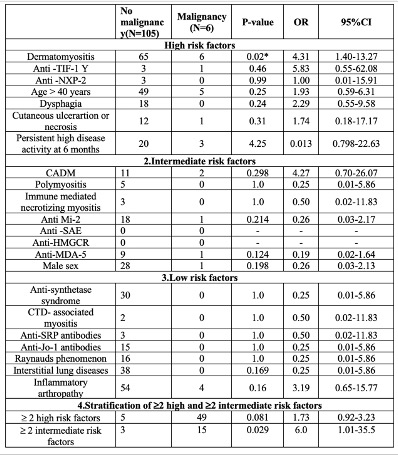Session Information
Date: Monday, November 18, 2024
Title: Muscle Biology, Myositis & Myopathies – Basic & Clinical Science Poster III
Session Type: Poster Session C
Session Time: 10:30AM-12:30PM
Background/Purpose: Idiopathic inflammatory myopathy (IIM) carries an elevated cancer risk. The International Myositis Assessment and Clinical Studies Group (IMACS) has issued evidence-based guidelines for cancer screening in IIM patients. These guidelines, are derived from retrospective studies and need validation across different populations. This study aims to identify cancers and associated risk factors and validate the risk strata as suggested in the IMACS guidelines.
Methods: This was a retrospective study which included patients with clinical diagnosis of IIM at tertiary care centre in India. The department IIM cohort was queried on 1/05/2024 and those who satisfied the EULAR/ACR criteria with a probability of ≥90%, were included in the study. Data on demographics, clinical features, laboratory parameters, serology, myositis-specific antibodies, tumor markers and treatment response were collected. Association between high, intermediate, and low-risk factors and malignancy, were evaluated using appropriate statistics
Results: We retrieved data from 111 patients with definite IIM. There were six patients (5.40%) with malignancy. Three had breast carcinoma, one carcinoma cervix, one lung cancer and one had metastatic adenocarcinoma. Five out of six malignancy were among those over 40 years of age (p=0.013) (Table 1). Association of high, intermediate, and low risk factors for malignancy are presented in Table 2. All patients with malignancy were dermatomyositis (OR-4.31, p=0.02). Patients with malignancy had higher median (IQR) Manual Muscle Testing-8 (MMT-8) of 74(61.75-78) vs 60(49-70) (p=0.065) and lower levels of muscle enzymes including creatine kinase (CPK), 99 (36-170) vs 710(150-3754) (p=0.011), aspartate transaminase (AST) 57.67(23.25-97.75) vs 94.5(54.75-191.75) (p-value=0.077), lactate dehydrogenase (LDH), 532(306-794.5) vs 600(348-939) (p=0.727)…. Ulcerative skin lesions and moderate to severe dysphagia were similar among those with and without malignancies. Patients with malignancy had significantly higher levels of tumor markers, CEA,mean-140.0 ng/mL vs 4.15(p=0.001) and CA-125,mean-88.0 U/mL vs 24.46(p=0.01).None with anti-synthetase syndrome, interstitial lung diseases or Raynaud’s phenomenon had malignancy. Patients with ≥2 high or intermediate risk factors had an OR (95%CI) of 1.73(0.92-3.23) and 6.0(1.01-35.5) respectively for malignancy (Table 2).
Conclusion: In our study, the types and incidence of malignancies in IIM mirrored the incidence in the Indian population. Dermatomyositis, advanced age, low muscle enzyme levels, and higher MMT-8 scores were significant predictors of increased cancer risk. Conversely, conditions like anti-synthetase syndrome, Raynaud’s phenomenon, and interstitial lung disease did not correlate with cancer occurrence. Our findings validate the IMACS cancer screening guidelines’ effectiveness in an Indian setting.
To cite this abstract in AMA style:
Kumari L, KONERU V, Philip s, Dunga s, gorijavulu M, Gopal A, Mariaselvam C, Thabah M, Negi V, Kavadichanda C. Cancer Risk and Screening Effectiveness in Idiopathic Inflammatory Myopathy: Validating IMACS Guidelines in a Retrospective Indian Cohort [abstract]. Arthritis Rheumatol. 2024; 76 (suppl 9). https://acrabstracts.org/abstract/cancer-risk-and-screening-effectiveness-in-idiopathic-inflammatory-myopathy-validating-imacs-guidelines-in-a-retrospective-indian-cohort/. Accessed .« Back to ACR Convergence 2024
ACR Meeting Abstracts - https://acrabstracts.org/abstract/cancer-risk-and-screening-effectiveness-in-idiopathic-inflammatory-myopathy-validating-imacs-guidelines-in-a-retrospective-indian-cohort/



